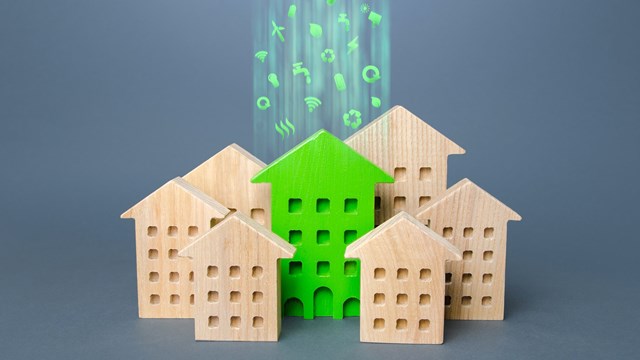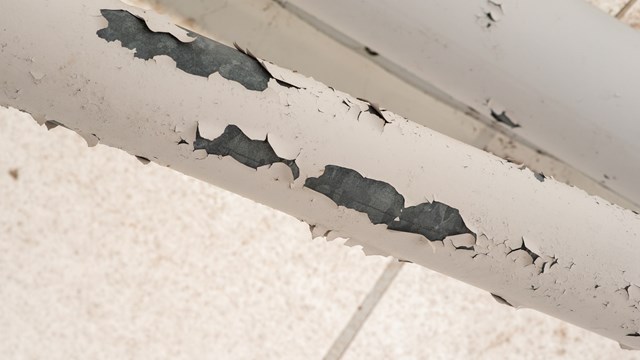Mayor Michael R. Bloomberg presented a $45.7 billion budget plan for fiscal year 2005 and awarded property owners a $400 tax rebate to thank New Yorkers for their sacrifices in helping the city weather its fiscal crisis.
"New York City's homeowners stepped up when the city needed them most," Mayor Bloomberg said in his State of the City address at Silvercup Studios in Long Island City. "Now that our fiscal situation has stabilized, they deserve to be rewarded for their sacrifice. Over the last two years, we have made the tough decisions that have maintained vital city services, kept control of the city finances with its elected officials and maintained the city's long term fiscal stability," the mayor said. "While we are not out of the woods yet and the city faces considerable challenges in the future, New York's finances are balanced and our best days are yet to come."
Mayor Bloomberg noted that over the past two years, New York had weathered its toughest fiscal crisis in a generation. Budget gaps hit all time highs; pension, Medicaid and other non-discretionary spending grew at a tumultuous rate, requiring more than $3 billion in revenue to close the budget gap. It took strong, decisive and disciplined financial management to stabilize the city's finances and strengthen overall tax revenues, he said. Economic improvement is evident in that Wall Street profits are expected to top $15 billion, a substantial increase over last year, but those figures are still well below industry projections, according to Bloomberg. Tourists are returning to New York City, hotel occupancy and room rates have increased and the real estate market remains healthy. Residential property values, noted Bloomberg, have increased by as much as 15 percent. Fiscal restraint, however, is still a necessity. While the city's finances have improved, the city is still facing an approximate $2 billion deficit next year, the mayor said.
Class 1 and Class 2 New York City property owners - of which there are 600,000 owner occupants of one-, two-, three-family homes, and co-ops and condominiums - will be eligible to receive a $400 tax rebate to help offset the 18.5 percent property tax increase that Mayor Bloomberg signed into law in December 2002. According to a recent study by the Citizen's Budget Commission, New Yorkers pay the highest taxes in the nation ($141 for every $1,000 they earn) - second only to California, $121; and Connecticut, $120. The least taxed states, according to the study, are New Hampshire and Tennessee. This rebate program will cost the city $250 million, according to the mayor's office.
Stephen Spinola, the president of the Real Estate Board of New York (REBNY) heralded the mayor's action. "The Real Estate Board of New York applauds Mayor Michael Bloomberg's decision to return some $250 million to the taxpayers of New York. The mayor clearly understands that the most important thing he can do is strengthen New York's business climate - one of the most fundamental methods of achieving that goal is to reduce the cost of living and doing business in New York City. We will work to encourage the City Council and state Legislature to adopt the mayor's proposal, and enact the legislation needed to effectuate the $400 rebate," says Spinola. "We are hopeful that as the city's economy continues to improve, the mayor will continue the trend of reducing the tax burden, and will provide relief to the business sector, which pays an overwhelming majority of taxes collected by the city of New York."
Margie Russell, the executive director of the New York Association of Realty Managers (NYARM) also welcomed the news about the tax relief. She said that anything that can help offset the increased costs in taxes, insurance, fuel and maintenance that homeowners and building managers pay is a benefit.
While Greg Carlson, the executive director of the Federation of New York Housing Cooperatives and Condominiums (FNYHC) also was receptive to the mayor's gesture, he notes that the benefits to homeowners in some boroughs remain inequitable. For example, in Queens, homeowners are paying significantly higher taxes than the 18.5 percent hike that was passed last year, Carlson said. Add to that the increased costs of insurance, heating fuel, building maintenance and other items, and managing the bottom line becomes more and more difficult, he said. In certain boroughs, the tax hike and the proposed tax rebate will negate one another, but not so in Queens, he believes.
The city's Independent Budget Office (IBO), a publicly-funded independent agency, seems to support Carlson's assessment. According to its study, the owners of single-family homes, who reportedly paid an average of $366 more in property taxes because of the 18.5 percent property tax increase, will gain after the $400 rebate checks but other types of property owners will lose out. The IBO reports that condo owners, who paid an average increase of $741, or co-op owners, who paid an average increase of $585, will not recover all their money with the rebate.
The City Council and state Legislature must approve the rebate plan for it to take effect.
IBO is equally skeptical that the mayor's budget plan can close significant gaps in revenue. The proposed budget gap will double in 2006 to $3.4 billion and jump to $3. 9 billion in 2007, the agency says.
According to IBO Director Ronnie Lowenstein, tax collections in fiscal year 2004 will be 13.2 percent higher than in 2003, but IBO's outlook for 2005 through 2007 is for much slower revenue growth, in part due to the expiration of the sales and personal income tax increases. The sales tax on clothing and footwear under $110 is scheduled to end on June 1, 2004, and the .375 percent temporary increase in the 8.625 percent sales tax will end on June 1, 2005. Business income taxes, which did not increase, are expected to grow by 12.4 percent from 2003 to 2004 when they will total $2.6 billion. However, that is below the record level that was reached in 2000.
Spending on municipal services is holding steady or in some cases declining, but that doesn't seem to help the budget shortfall, according to IBO. Costs related to Medicaid, pensions and fringe benefits for municipal employees, and debt service continue to rise. The city's share of Medicaid, which stands at $4 billion in 2004, will go to $4.5 billion next year and reach $4.9 billion in 2007. The city's contribution to five pension funds for city workers will grow by $610 million in 2005 to total over $3 billion. By the year 2007, that cost will balloon to $4.2 billion, according to IBO's projections. Additionally, interest on the city's debt will go from $3.4 billion in 2004 to $4.9 billion by 2007. IBO believes that total city spending will rise to $47.7 billion in 2005 and climb to $51.1 billion by 2007.
Despite the gloomy outlook, Mayor Bloomberg said in his address that the overall quality of life in the city had greatly improved. New York City remains a great place to do business, crime has dropped 10 percent - its lowest level since 1968 - and through initiatives like the 311 hotline and other technological advances, residents can expect to receive a greater level of public service from the government agencies that represent them, said the mayor.
"New York City continues to be the best place on earth for people to live, work, do business, and visit. I am committed to ensuring that New York City's future is even brighter. Together we can make that happen."







Leave a Comment